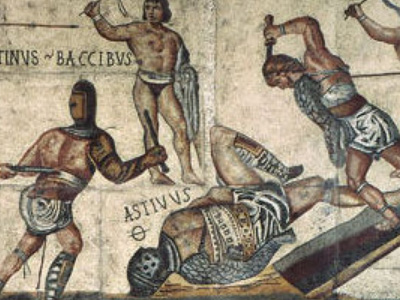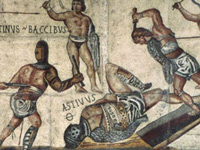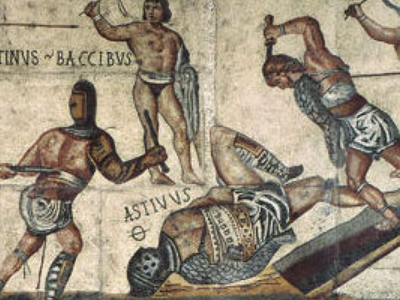Third Servile War (73-71 BC)

Aftermath
The rebellion of the Third Servile War was annihilated by Crassus. Although Pompey's forces did not directly engage Spartacus's forces at any time, his legions moving in from the north were able to capture some 5,000 rebels fleeing the battle, "all of whom he slew". After this action, Pompey sent a dispatch to the Senate, saying that while Crassus certainly had conquered the slaves in open battle, he himself had ended the war, thus claiming a large portion of the credit and earning the enmity of Crassus.
While most of the rebel slaves were killed on the battlefield, some 6,000 survivors were captured by the legions of Crassus. All 6,000 were crucified along the Appian Way from Rome to Capua.
Pompey and Crassus reaped political benefit for having put down the rebellion. Both Crassus and Pompey returned to Rome with their legions and refused to disband them, instead encamping outside Rome. Both men stood for the consulship of 70 BC, even though Pompey was ineligible because of his youth and lack of service as praetor or quaestor. Nonetheless, both men were elected consul for 70 BC, partly due to the implied threat of their armed legions encamped outside the city.
The effects of the Third Servile War on Roman attitudes towards slavery, and on the institution of slavery in Rome, are harder to determine. Certainly the revolt had shaken the Roman people, who "out of sheer fear seem to have begun to treat their slaves less harshly than before." The wealthy owners of the latifundia began to reduce the number of agricultural slaves, opting to employ the large pool of formerly dispossessed freemen in sharecropping arrangements. With the end of Augustus' reign (27 BC - 14 AD), the major Roman wars of conquest ceased until the reign of Emperor Trajan (reigned 98–117 AD), and with them ended the supply of plentiful and inexpensive slaves through military conquest. This era of peace further promoted the use of freedmen as laborers in agricultural estates.
The legal status and rights of Roman slaves also began to change. During the time of Emperor Claudius (reigned 41–54 AD), a constitution was enacted that made the killing of an old or infirm slave an act of murder, and decreed that if such slaves were abandoned by their owners, they became freedmen. Under Antoninus Pius (reigned 138–161 AD), laws further extended the rights of slaves, holding owners responsible for the killing of slaves, forcing the sale of slaves when it could be shown that they were being mistreated, and providing a (theoretically) neutral third party to which a slave could appeal. While these legal changes occurred much too late to be direct results of the Third Servile War, they represent the legal codification of changes in the Roman attitude toward slaves that evolved over decades.
It is difficult to determine the extent to which the events of this war contributed to changes in the use and legal rights of Roman slaves. The end of the Servile Wars seems to have coincided with the end of the period of the most prominent use of slaves in Rome and the beginning of a new perception of slaves within Roman The Roman Republic was a form of government of Rome and the era of the classical Roman civilization when it was run through public representation of the Roman people. Beginning with the overthrow of the Roman Kingdom (traditionally dated to 509 BC) and ending in 27 BC with the establishment of the Roman Empire, Rome's control rapidly expanded during this period - from the city's immediate surroundings to hegemony over the entire Mediterranean world. society and law. The Third Servile War was the last of the Servile Wars, and Rome did not see another slave uprising of this magnitude again.
The Roman Republic was a form of government of Rome and the era of the classical Roman civilization when it was run through public representation of the Roman people. Beginning with the overthrow of the Roman Kingdom (traditionally dated to 509 BC) and ending in 27 BC with the establishment of the Roman Empire, Rome's control rapidly expanded during this period - from the city's immediate surroundings to hegemony over the entire Mediterranean world. society and law. The Third Servile War was the last of the Servile Wars, and Rome did not see another slave uprising of this magnitude again.
HISTORY

RESOURCES
This article uses material from the Wikipedia article "Third Servile War (73-71 BC)", which is released under the Creative Commons Attribution-Share-Alike License 3.0.
© Stories Preschool. All Rights Reserved.









